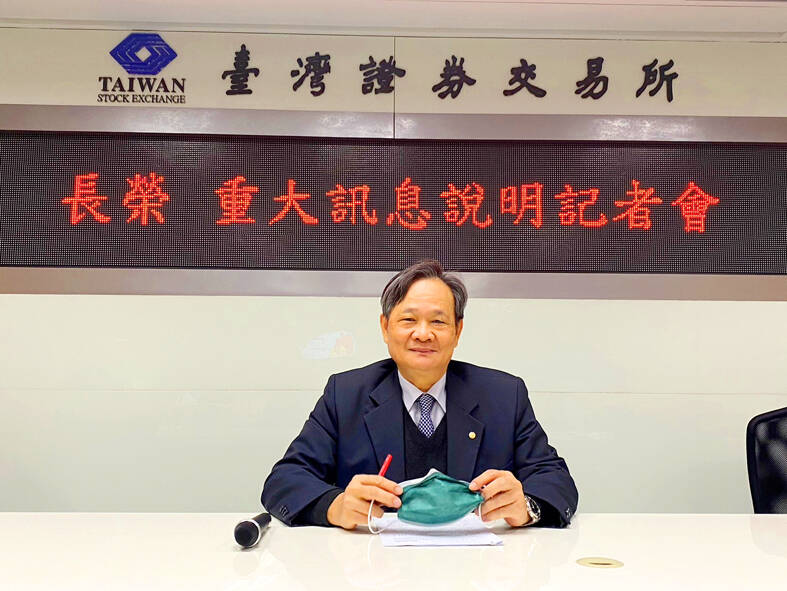Evergreen Marine Corp (長榮海運) yesterday said that it has acquired a 10 percent stake in Charing Yang Development Co (長陽開發) for NT$450 million (US$14.67 million) as the nation’s largest container cargo shipper aims to seek stable dividend income.
The investment raises Evergreen Marine’s stake in Charing Yang Development to 50 percent, company president Eric Hsieh (謝惠全) told a news conference in Taipei.
Hsieh said Evergreen Marine increased its investment in Charing Yang, as the developer has reported stable profit growth and dividends in the past few years on the back of rent revenue from department stores in central Taoyuan.

Photo: CNA
The shipper expects the value of real estate in the area to increase, he said.
Evergreen Marine has also decided to purchase two office buildings in Taoyuan from Evergreen International Corp (長榮國際) for NT$4.74 billion, Hsieh said.
The property purchase is for the shipper’s own use and aims to reduce rental costs while seeking investment gains, he said.
Commenting on the outlook of the cargo shipping sector, Hsieh said that Evergreen Marine has seen demand rebound from last month, with its load factor rising above 90 percent this month following the easing of COVID-19 restrictions in China.
Freight rates on some routes have decreased at a slower rate, while some have begun to recover, he said.
With some of its peers planning to charge higher fees from next month, Evergreen Marine plans to follow suit by imposing an additional fee of US$1,000 per container on US routes, given rising demand, Hsieh said.
“Business should be rosy before the Lunar New Year holiday,” he said.
Next year, Russia’s invasion of Ukraine and the implementation of stricter emissions rules by the International Maritime Organization would affect the shipping market the most, Hsieh said.
Evergreen last month reported a double-digit annual fall in revenue to NT$36 billion, but its cumulative revenue still rose 37 percent to NT$597 billion for the first 11 months of this year thanks to strong revenue growth in the first half of this year, company data showed.

GEOPOLITICAL ISSUES? The economics ministry said that political factors should not affect supply chains linking global satellite firms and Taiwanese manufacturers Elon Musk’s Space Exploration Technologies Corp (SpaceX) asked Taiwanese suppliers to transfer manufacturing out of Taiwan, leading to some relocating portions of their supply chain, according to sources employed by and close to the equipment makers and corporate documents. A source at a company that is one of the numerous subcontractors that provide components for SpaceX’s Starlink satellite Internet products said that SpaceX asked their manufacturers to produce outside of Taiwan because of geopolitical risks, pushing at least one to move production to Vietnam. A second source who collaborates with Taiwanese satellite component makers in the nation said that suppliers were directly

Top Taiwanese officials yesterday moved to ease concern about the potential fallout of Donald Trump’s return to the White House, making a case that the technology restrictions promised by the former US president against China would outweigh the risks to the island. The prospect of Trump’s victory in this week’s election is a worry for Taipei given the Republican nominee in the past cast doubt over the US commitment to defend it from Beijing. But other policies championed by Trump toward China hold some appeal for Taiwan. National Development Council Minister Paul Liu (劉鏡清) described the proposed technology curbs as potentially having

EXPORT CONTROLS: US lawmakers have grown more concerned that the US Department of Commerce might not be aggressively enforcing its chip restrictions The US on Friday said it imposed a US$500,000 penalty on New York-based GlobalFoundries Inc, the world’s third-largest contract chipmaker, for shipping chips without authorization to an affiliate of blacklisted Chinese chipmaker Semiconductor Manufacturing International Corp (SMIC, 中芯). The US Department of Commerce in a statement said GlobalFoundries sent 74 shipments worth US$17.1 million to SJ Semiconductor Corp (盛合晶微半導體), an affiliate of SMIC, without seeking a license. Both SMIC and SJ Semiconductor were added to the department’s trade restriction Entity List in 2020 over SMIC’s alleged ties to the Chinese military-industrial complex. SMIC has denied wrongdoing. Exports to firms on the list

TALENT FACTOR: The nation’s chip sector would be difficult to replace, but to maintain that advantage, Taiwan must retain skilled workers, an academic said A group of experts on Sunday called on Taiwan to strive to maintain its world-leading position in the semiconductor industry, with a US-China chip dispute expected to continue regardless of who becomes the next US president. Tamkang University Graduate Institute of International Affairs and Strategic Studies director Li Da-jung (李大中) said at a Taipei seminar on global semiconductor security that the relationship between the two superpowers would remain confrontational. There appears to be “no turning back” in US-China relations, as US presidential candidates US Vice President Kamala Harris and former US president Donald Trump are both expected to continue Washington’s hawkish stance